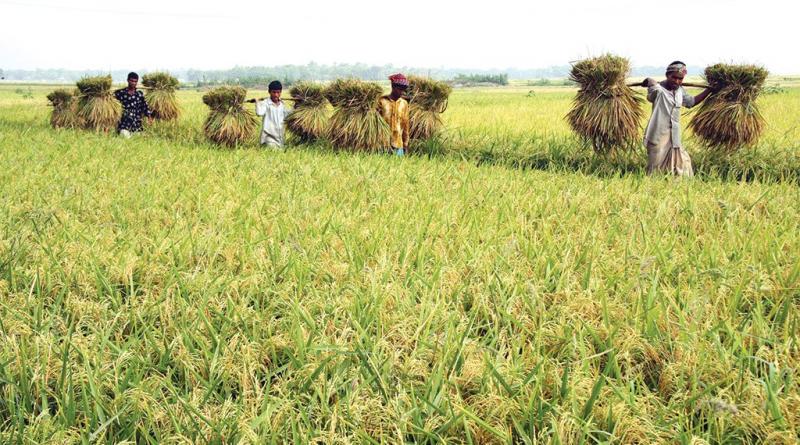 Despite a gradual reduction of arable land, Bangladesh’s farm output and the agriculture sector’s growth is on the rise, which analyst attributed to the government’s timely policies.
Despite a gradual reduction of arable land, Bangladesh’s farm output and the agriculture sector’s growth is on the rise, which analyst attributed to the government’s timely policies.
According to the 2011 census, the annual population growth is 1.37 (per 1000). Along with it, the average growth of the agriculture sector over last 10 years stood at 3.8 percent.
Crop yield per hectare increased from 3,761 kg to 4,629 kg in nine years. Food grain production increased from 34.71 million tons in 2008-09 to 38.63 million tons in 2016-17.
“This (the growth in the agriculture sector) is the outcome of timely agriculture-friendly policies and actions,” said Anwar Faruque, a former agriculture secretary.
He added that expansion of the scope of research for innovation regarding disaster-tolerant varieties of rice and other crops will also play a key role for sustainable growth.
The government has taken initiatives such as, the introduction of cards for fertilizer, seeds and other agricultural inputs; mechanization of irrigation and farming; diversification and marketing of crops; and agricultural rehabilitation support to help the sector flourish.
“To make these initiatives more useful, we will further enhance efficiency of these programmes using modern technology,” Finance Minister AMA Muhith said in his budget speech for 2018-19 fiscal year.
The government has also taken initiatives to directly transfer cash benefits to farmers using mobile banking as the list of farmers holding cards for agriculture input assistance is being updated.
In order to continue agriculture-friendly initiatives, the government has spent Tk 90 billion annually to subsidise the sector. The government has also been emphasising environmentally-friendly, and climate-adaptation, programs to ensure sustainable development in the agriculture sector.
“We are working on innovation of technology and crop varieties through research; and disseminating the results thereafter,” Muhith said.
State-owned Bangladesh Agricultural Research Institute (BARI), Bangladesh Institute of Nuclear Agriculture (BINA) and Bangladesh Rice Research Institute (BRRI) have already invented different types of crop varieties which are able to resist adverse effects of natural calamities.
Of these, BRRI invented more than 10 saline, drought, and submergence-resistant rice— varieties which are gaining popularity among farmers.
In the next fiscal year, the government aims to create 22 new varieties of crops and 21 new forms of technology. Besides, research on innovating disaster-tolerant and environment-friendly varieties of jute, and diverse jute products, are going on in full swing, the finance minister said.
Additionally, the government has taken steps to reduce the use of chemical fertilizer and protect land fertility by increasing the use of organic and balanced fertilizer—as well as to increase crop productivity.
It has also taken initiatives to establish, and renovate, fertilizer laboratories and research centres to ensure quality of fertilizers.
Apart from agriculture, the country’s fisheries sector has also made significant progress in the last decade.
According to a 2016 report by the Food and Agricultural Organization, based on a global ranking, Bangladesh was fourth in inland open water fish farming and fifth in inland closed water fish production.
 National
National
30862 hour(s) 36 minute(s) ago ;
Afternoon 05:30 ; Wednesday ; Apr 24, 2024
Timely govt policies boosted agriculture
Send
Abu Siddique
Published : 06:00, Jul 12, 2018 | Updated : 06:00, Jul 12, 2018
Published : 06:00, Jul 12, 2018 | Updated : 06:00, Jul 12, 2018
0 ...0 ...
/zmi/
Topics: Top Stories
- KOICA donates medical supplies to BSMMU
- 5 more flights to take back British nationals to London
- Covid19: Rajarbagh, Mohammadpur worst affected
- Momen joins UN solidarity song over COVID-19 combat
- Covid-19: OIC to hold special meeting
- WFP begins food distribution in Cox’s Bazar
- WFP begins food distribution in Cox’s Bazar
- 290 return home to Australia
- Third charter flight for US citizens to return home
- Dhaka proposes to postpone D8 Summit
Unauthorized use of news, image, information, etc published by Bangla Tribune is punishable by copyright law. Appropriate legal steps will be taken by the management against any person or body that infringes those laws.
Bangla Tribune is one of the most revered online newspapers in Bangladesh, due to its reputation of neutral coverage and incisive analysis.
F R Tower, 8/C Panthapath, Shukrabad, Dhaka-1207 | Phone: 58151324; 58151326, Fax: 58151329 | Mob: 01730794527, 01730794528


